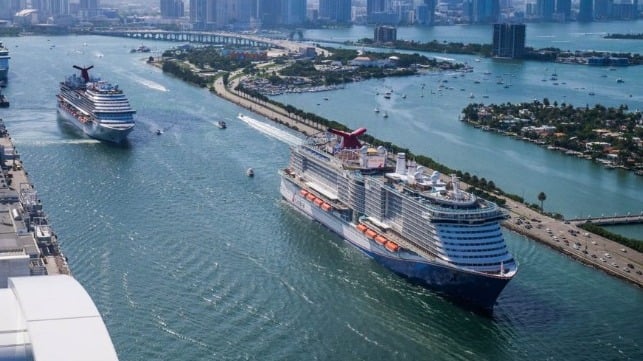CDC Appeals Court Decision in Attempt to Maintain Cruise Restrictions

In the latest turn in the ongoing legal fight between the Centers for Disease Control and Florida over the restrictions on cruise ships sailing from U.S. ports, the CDC filed an appeal in federal court seeking to overturn the district court’s ruling and blocking the lower court’s injunction against the conditional sailing order governing the restart of cruising. The lower court had sided with Florida, giving the CDC till the beginning of July to propose narrow restrictions while ordering the two sides to mediate the case.
In a notice filed with the 11th U.S. Circuit Court of Appeals, the CDC contends that the restrictions on cruises from U.S. ports are critical to continuing efforts to prevent the spread of the new variants of COVID-19 in the United States. They also said that the court’s actions were unnecessary as the CDC provided the framework for the restoration of cruising from U.S. ports and cited the numerous examples of cruise ships that have either been approved to operate simulated voyages or that have begun sailing under the restricted cruise provisions.
In recent weeks, the U.S. cruise industry, including in Florida, has begun to resume operation. Celebrity Cruises started the first revenue cruises from Port Everglades in June and Royal Caribbean International became the first cruise line to complete the trials to begin commercial cruises without requiring 95 percent of passengers to be vaccinated. At the beginning of July, Carnival Cruise Line and Royal Caribbean both resumed cruises including departures from PortMiami and the Port of Galveston.
“The conditional sailing order is an important tool in ensuring that cruise ship operations do not exacerbate the spread of dangerous COVID-19 variants during this inflection point in the pandemic,” the CDC writes in its notice of appeal. “It does not shut down the cruise industry but instead provides a sensible, flexible framework for reopening, based on the best available scientific evidence.”
The CDC goes on to say that it believes cruise ships resent a unique situation due to the prolonged time passengers and crew remain in close proximity. They also point to the varying situations in the ports of call and the potential for passengers to bring back new variants of the virus to the U.S. after their cruise.
Florida had filed its lawsuit in the spring contending that it was suffering immediate harm from the loss of revenues and unemployment due to the CDC’s orders. Attorneys for the state said that the CDC was overstepping its authority in regulating cruises, was singling out the industry for stricter rules than other segments of the hospitality industry, and slow to respond to changes such as the vaccinations, new scientific information, and better routines to control the spread of the virus.
U.S. District Judge Steven Merryday issued a ruling on June 18 saying that the court found that Florida was likely to prevail in the case. The judge said that Florida had provided sufficient proof of harm from the CDC’s regulations and that the CDC was overstepping its authority. The judge granted a temporary injunction due to start in mid-July changing the CSO to recommendations as opposed to restrictions. The court gave the CDC until July 2 to propose a narrow policy for the cruise industry within the court’s view of the agency’s authority.
The CDC is now arguing that the cruise industry is proceeding with a prudent restart following its framework and that there is no evidence that if the injunction were to go into effect later this month that cruises would restart quicker to provide Florida greater revenues. The CDC says that the CSO is part of its long-standing authority to oversee health issues on the foreign-flag ships calling at U.S. ports and that Florida efforts would disrupt an orderly restart of the cruise industry.
The cruise lines continue to find themselves caught between the opposing positions. Celebrity Cruises, for example, which announced it would require vaccinations, is now asking passengers to voluntarily indicate their vaccination status or else agree to testing and restrictions aboard its cruise ship to meet Florida’s law banning asking for proof of vaccinations. Carnival and Royal Caribbean also adjusted their policies for their cruises from Florida while other cruise lines planning to restart sailing later in the summer are telling passengers that they will advise of the final protocols closer to their sailing date.
